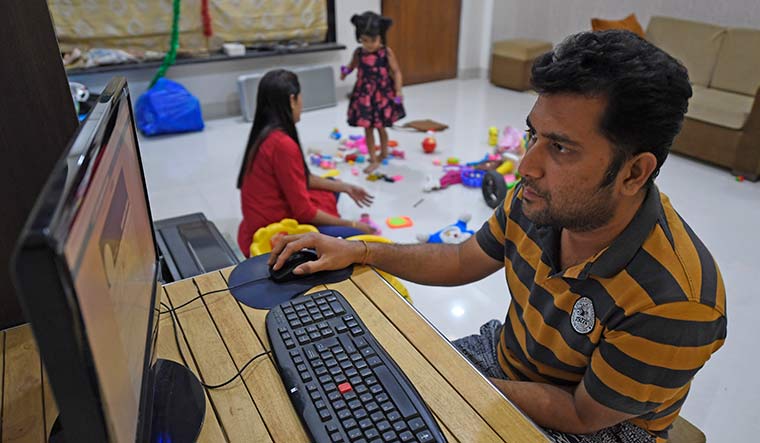Once the storm is over, you won’t remember how you made it through, how you managed to survive. You won’t even be sure whether the storm is really over. But one thing is certain. When you come out of the storm, you won’t be the same person who walked in.”
—Haruki Murakami, Kafka on the Shore
The party theme was “Hawaiian” and all the guests had dressed accordingly. While the boys sported floral T-shirts and Bermuda shorts, the girls wore the best-imitation of a hula skirt. One of them even had an imitation head-piece akin to the floral ones the islanders wear. Peppy dance numbers blared through the speakers. While some of his friends danced, Nayan fixed his own drink, a bright-coloured Rooh Afza-mix which stood in for a tropical cocktail.
The drink or the costumes were not the only thing “not so real” about the whole party. It was all virtual. Nayan, after all, is just five years old, and the party was something his school had come up with as a fun activity for the students cooped up indoors. It was done on the platform on which the school has been conducting online classes, Microsoft Teams, with the kids tuning in at the pre-fixed hour to gaze into the screen and “party” with their classmates.
“Virtual partying” is a term that has gained currency over the past two months as a world in quarantine looked around for new ways to socialise, along with other words or phrases that have become commonplace, like “social distancing” and “Zoom bombing”. And, as we take uncertain steps into a not-so-brave new world after lockdown, another term will perhaps get even more commonplace. The “new normal”.
Though initially used to describe business conditions in the western world following the financial meltdown of 2007-2008, the term has resurged now globally following the Covid-19 pandemic. The “new normal” is already here, and the changes go way beyond the mask you have to wear.
In China, an Aarogya Setu-like tracing app has become mandatory for citizens. New Zealand has come up with the “Social Bubble”—the list of people you can opt for to interact with. Countries from Israel to the UK now micromanage what their citizens can or cannot do—from going out for walks to which shops are allowed to remain open. Thermal scanners and drone surveillance have now become almost ubiquitous.
There are positive takeaways, too. “What this crisis has done is to create willingness to look past the status quo to see what is next,” explains Siddhartha Gupta, CEO of Mercer Mettl, subsidiary of the global human resources firm Mercer. So, after decades of the norm of getting together physically for work, Covid-19 might just have made us relook at the way we go to work. Or not go, in this case.
* THERE’S NO PLACE LIKE HOME
The lockdown may have made us retreat into a bubble, but it is a digitised bubble—from virtual parties to conference calls, webinars to online learning courses.
More and more sectors and companies are coming around to the realisation that work from home (WFH), well, works! Information technology sector in India has been the flag-bearer in this. Tata Consultancy Services managing director and CEO, Rajesh Gopinathan, has already announced that he plans to keep at least 75 per cent of his employees on remote working going forward. “This is our new operating model and represents the future of work,” says Gopinathan. “It helps our employees enjoy a better quality of life and it helps organisations become more resilient, because the fully distributed nature of this model is inherently less risky and better suited for business continuity and agility.”
The trend is here to stay, at least to some extent. While the benefits for employees include saving time from commuting and better work-life balance, employers have actually experienced more productivity, accountability and transparency from employees. There are practical reasons, too. Social distancing norms mean many offices will not be able to function with full strength, at least until a vaccine for Covid-19 is found. WFH, coupled with hot-desking (allocating desks to workers when they are required or on rotation) and technology means you need lesser office spaces.
* ON THE LINE. ONLINE
While the expected dip in the economy as a fallout of Covid-19 would mean that many companies and jobs would go for a toss, it will also mean professionals will have to keep their ears to the ground, constantly. “Now more than ever, youngsters would have to be more agile, adaptable and would need to constantly upskill their knowledge and skills,” says Payal Kumar, professor and chair (HR and Organisational Behaviour) at BML Munjal University.
This means entrepreneurship, and the gig economy, will flower. “When people are sitting at home, they will start thinking and innovating,” argues Dharmender Kumar Gemini, a business consultant and former CFO with Airtel, “With jobs on the line all over the place, professionals will be forced to innovate new ways of business.”
“We do not trust our employers to pay our bills anymore,” says Jerin George, a copywriter at an ad firm. “Everybody is now looking at supplementary incomes, looking up the internet to find other creative ways.” Recruiters say job postings for WFH “gig” work has gone up 30 per cent in March and April.
“Google search trends indicate that searches for ‘starting a business’ and ‘e-commerce’ have gone up in the last 60 days in India,” points out Manish Dalal, senior vice president and general manager, Endurance Group- APAC, a company which helps small businesses with digitisation. “Individuals and small businesses challenged by Covid-19 are progressively looking at leveraging the internet to create their online presence and connect with their customer.”
Digitisation has got a fillip post the lockdown. A recent study pointed out how more than half of those surveyed said they shopped online for items they normally used to physically buy from a store. Retail biggies have also adapted: Big Bazaar reported online and telephonic sales accounted for 30 per cent of its revenue during this period.
* TOUCH ME NOT
In the post-Covid-19 world, “no contact” might become the standard. Sanitary- and gadget-makers are working hard to bring out products that work on sensors, and tech companies like Apple and Samsung are trying to bring out phones that could work as virtual debit cards. Recently, the Reserve Bank of India wrote to payment networks like Visa, Mastercard and the National Payments Corporation of India to allow tap-and-go functionality on card payments at all shops, soon, instead of swiping. “A contactless revolution in communication, collaboration and commerce is imminent,” says Dalal.
* KEEP DISTANCE
The new rules of social engagement will include a big dose of distancing. IITs have already earmarked a new matrix for classrooms as well as staggered schedules. The directorate general of civil aviation has proposed a seating arrangement where a certain number of seats in flights are left vacant. From Restaurants Association of India talking about fewer tables and contactless menu to multiplexes talking about new seating arrangements, everyone is preparing themselves for a new reality.
* HEAL THE WORLD
The lockdown period spawned many memes, some funny and some poignant, on human impact on the world. “Ideally, I would like this black swan event to help us lead lives that are less materialistic and leave less carbon footprints,” says Kumar.
Sunil Menon, a Chennai-based choreographer and activist, says: “Of course, the way our society has been leading this consumption-fuelled life has just been unsustainable. This is nature’s revenge; we have to change. In many ways, I am actually so respectful of this new normal.”
But will it last? “While a few people may make lifestyle changes, I believe [soon enough], we will largely be sucked back into the same enticing lifestyle as before,” sighs Kumar. It will be curious to see whether the “new normal” is just a bump along the way or a path-changing reality.


